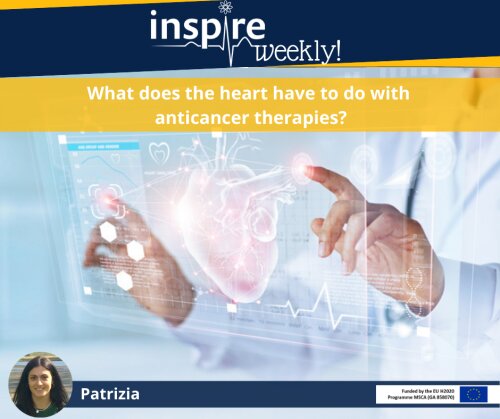24/11/2021 - Patrizia (ESR #12)

During the last decade, cancer treatment has undergone a revolutionary progress, moving from non-selective cytotoxic therapies to novel molecular targeted drugs, specifically addressed to cellular pathways overexpressed in cancer cells but not in normal cells 1. Many of these new antineoplastic therapeutics (i.e., Vascular Endothelial Growth Factor (VEGF) inhibitors) have significantly improved cancer prognosis and cancer survivorship. However, several cardiovascular complications have emerged as associated to these therapies (i.e., VEGF inhibitors often cause hypertension, left ventricular dysfunction and thromboembolism), without being anticipated in preclinical studies 2. As a result of these cardiovascular adverse sequelae related to novel anticancer target therapies, the new discipline of cardio-oncology has emerged 3. This multidisciplinary field is focused on limiting and predicting cardiovascular dysfunctions in cancer patients and survivors 4, with the dual aim of reducing mortality for cardiovascular complications in cancer patients, as well as improving our understanding of signalling events implicated in these manifestations.
How do VEGF inhibitors induce cardiovascular toxicities? Several hypotheses have been proposed to explain cardiovascular complications associated with anti VEGF therapies, which either prevent activation of VEGF-receptors (i.e., VEGF antibodies) or interfere with signal transduction (i.e., receptor tyrosine kinase inhibitors (RTKIs)). However, a clear understanding of the processes by which VEGF inhibition impairs cardiovascular function remains to be elucidated 5. During my PhD I will investigate the possible mechanisms underpinning RTKI-induced cardiovascular toxicities. Using preclinical models for the haemodynamic assessment of anti-VEGF therapies represents a valuable method to predict haemodynamic changes associated with these drugs, in addition to permitting the understanding of the mechanisms responsible for RTKIs-related cardiovascular toxicity.
References:
- Gerber, D.E. Targeted therapies: a new generation of cancer treatments. Am Fam Physician 77, 311-319 (2008).
- Sheng, C.C., et al. 21st Century Cardio-Oncology: Identifying Cardiac Safety Signals in the Era of Personalized Medicine. JACC: Basic to Translational Science 1, 386-398 (2016).
- Campia, U., et al. Cardio-Oncology: Vascular and Metabolic Perspectives: A Scientific Statement From the American Heart Association. Circulation 139, e579-e602 (2019).
- Guha, A., Armanious, M. & Fradley, M.G. Update on cardio-oncology: Novel cancer therapeutics and associated cardiotoxicities. Trends Cardiovasc Med 29, 29-39 (2019).
- Small, H.Y., Montezano, A.C., Rios, F.J., Savoia, C. & Touyz, R.M. Hypertension due to antiangiogenic cancer therapy with vascular endothelial growth factor inhibitors: understanding and managing a new syndrome. Can J Cardiol 30, 534-543 (2014).